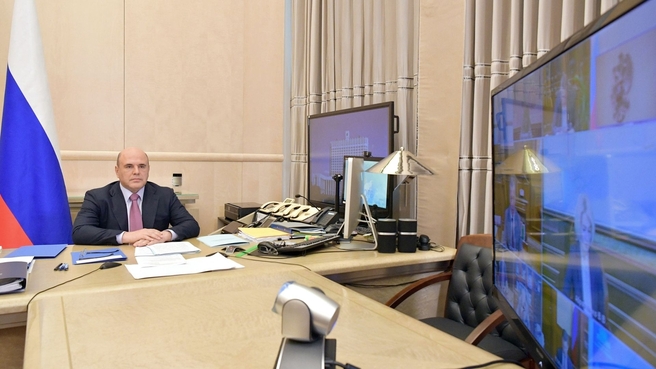The agenda: Implementing the strategy to support senior citizens, rural pensioners, and subsidising manufacturers of rehabilitation means for people with disabilities.
Mikhail Mishustin’s opening remarks:
Good afternoon, colleagues. Today I would like to begin with the subject of support for senior citizens. Our parents and grandparents do not only need care. A lot of them can and want to enjoy active lifestyles, though with some limitations, including working, learning new skills, doing physical therapy exercises and going to concerts and visiting museums. Recently, we visited a day-care centre for the elderly in Dmitrov. You know, there aren’t so many active and kind people who are ready to communicate and share their warmth and attention in student halls.
As part of the second stage of the Action Strategy for the Benefit of Older Citizens in the Russian Federation, the Government has prepared an action plan for its implementation for a period of the next four years. The plan expands the list of measures aimed at introducing more up to date types of social services considering the accumulated experience and practices tested out in the regions. The priority goals include the use of a proactive mechanism for assigning and paying pensions, as well as supplementary social payments, so that senior citizens do not have to worry or waste time going from one place to another, filling out forms and submitting applications.
It is necessary to provide retraining for those who want to work. Monitoring will be organised over how the rights of employees of pre-retirement and retirement age are respected.
We will continue to work towards creating a more friendly system of all types of long-term care, from staying at social accommodation services to all the necessary aid and services at home. We plan to build new social infrastructure facilities using the mechanisms of private-public partnership.
We have also envisaged measures to improve the quality of medical assistance. Additional training will be organised for doctors and medical personnel on how to work with senior patients.
Of great significance is the well-considered system of leisure pursuits, the ability to engage in physical fitness activities in the neighbourhood, and access to cultural events. These are the vital ingredients for active aging and healthy longevity needed for a more comfortable and fuller life of our silver age senior citizens.
Here is another topic concerned with support for pensioners. In accordance with the President’s instructions, the Government has approved a procedure for paying a 25 percent pension supplement to those who have worked in agriculture for at least 30 years.
This supplement is available to agronomists, vets, technologists, engineers and other people from a list of over 500 professions, provided they work for an agricultural company.
During a meeting with the leaders of State Duma factions, the President emphasised the importance of preserving pension supplements for these people even if they move to cities. People can become urban dwellers for various reasons, including due to changes in the administrative boundaries of localities. This must not have a negative impact on the payments provided to these people by the state. According to the new rules, such pensioners with a work record of 30 years will receive these payments already at the beginning of next year.
The next subject concerns people with special needs. The President has instructed us to support the producers of rehabilitation equipment for them, including the companies that create software and manufacture medical rehabilitation and barrier free environment equipment.
There are over 1.5 million physically disadvantaged people in Russia who need artificial limbs, hearing aids, wheelchairs and many other types of equipment. There are not enough domestically made products of this kind, although the demand is considerable.
The Government has approved the rules for subsidising such producers. They need to take part in tenders to be able to receive up to 50 million roubles for comprehensive projects designed to create, test and manufacture new products for people with disabilities. These funds can be invested in R&D, equipment rental or salaries.
The funds will be allocated for up to three years. The key requirement is that recipients must invite those whom they are working for, that is, people with disabilities, for testing their output. And they must take their opinion into account.
This assistance will help our businesses to expand production and to also make modern rehabilitation equipment more affordable for people in our country.










